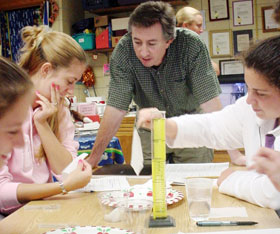  |
| HOME | THIS ISSUE | CALENDAR | GRANTS | BACK ISSUES | < BACK | NEXT > |
Professor gives future teachers hands-on science experienceby Karen Singer - October 17, 2005 |
||||
|
Peering through tiny magnifying glasses, students scrutinize square pieces of tissues and paper towels. “What senses are you using?” asks their teacher, David Moss, an associate professor in the Department of Curriculum and Instruction in the Neag School of Education. “Sight,” replies one. “Touch,” says another. “Did anybody hold a piece up to their ear?” Moss inquires. Not a single hand goes up among the nearly two dozen UConn senior education majors seated at tables in Nancy Titchen’s classroom at the Dorothy C. Goodwin Elementary School in Storrs. Continuing the experiment, the students pour water from graduated cylinders into paper plates, dunk the tissues and paper in the water, use tweezers to pluck out the soggy bits, and count them to determine how many pieces of each type sop up the same amount of liquid. These UConn students are participating in an exercise – just-released by the state Department of Education – for teachers to prepare fifth and eighth-grade students for a new science test on the Connecticut Mastery Test (CMT). “It is intended to be a guide for instilling the concepts on the science test the state will be implementing soon,” explains Moss, one of this year’s University Teaching Fellows. “The state is requiring what they call embedded assessment, a way of ensuring that students have inquiry experiences, and this is an example of what they think students should be experiencing.” Moss and Titchen were on the committee to develop the state standard for science education and they believe it’s important for teachers to take the test, too. Moss moves around the classroom, asking questions and urging students to share their thoughts. He sparks an almost palpable surge of interest when he informs the budding teachers they will be at the vanguard of “this new era” of science testing. “I use the general notion of empowerment,” Moss says. “A lot of times kids come to our program and just want to learn to teach. We want them to embrace the notion of leadership and being reform-minded, thinking about novel ways of teaching and learning.” Moss regards education as “an apprenticeship” of experience. “I want my students to be in a completely different place at the end of my class,” he says, even though this may mean they need time to work through problems.
He’s also a firm believer in “peer-to-peer discourse,” where students learn from one another under the guidance of an expert. “Without that step, you’re exposing kids to ideas but not promoting learning,” he says. Moss earned a bachelor’s degree in biology and education at Alfred University in New York State, and a master’s in botany and a Ph.D. in education from the University of New Hampshire. He joined the UConn faculty in 1998 and specializes in science education. Moss describes his teaching philosophy as “constantly evolving” through self-evaluation and conversations with colleagues. “We talk about it at lunch, in the hallways, and in committees,” he says. “It’s in the air at the School of Education. We’re constantly pushing each other.” Moss has kept a teaching journal “ for many years” and tries to videotape at least one class a semester. “I used to watch it twice,” he says, “at first horrified by the way I sounded and looked. I’ve gotten beyond that to observations such as ‘Wow I was really rushed,’ or‘I can’t believe I kept cutting those students off.’” Moss says it’s important to know students as learners: “You need to know where students are at and what they need to know to learn something new.” He also advocates promoting discourse within the class: “If you’re just standing up and talking all the time, how do you know it’s getting through or if it’s relevant?” His methods appear to be working. After the Goodwin elementary school class, several students praise Moss’s teaching skills and his attentiveness to their needs, both in and out of the classroom. Says Amy Beardsworth, “He’s the kind of teacher I aspire to be.” |
| ADVANCE HOME UCONN HOME |

